QEN Event: Embedding Digital Literacies.
The Quality Assurance Agency (QAA) is the independent body entrusted with monitoring, and advising on, standards and quality in UK higher education.? The scale, shape, structure and purpose of learning provision are continually changing in the UK and around the world. The QAA has a very important role in anticipating and responding to these changes in order to safeguard the reputation of UK higher education, support economic opportunity for the UK, and provide assurance to those who invest in and undertake learning.
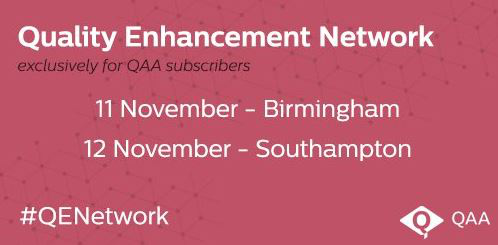
To further this mission the QAA team run a number of regional Quality Enhancement Network (QEN) events throughout the year that are open to QAA subscribers (which include all UK universities and many Further Education Colleges and alternative providers). These events bring together quality assurance professionals, practitioners and others with an interest in higher education to share practice and experience, and to discuss and debate current issues. While the QEN events promote good practice the events are very much an opportunity to share all practice and reflect on both successes and failures.
The Higher Education Reviews carried out by the QAA on individual higher education have a core element and a thematic element. The thematic element, or theme, is selected by the Higher Education Review Group - which includes representatives of the Higher Education Funding Council for England, Universities UK, GuildHE and Association of Colleges - and changes periodically. One of the two themes for 2015- 2016 is digital literacy, the other is employability. Providers undergoing reviews in 2015-16 will be required to explore one of these themes. The challenges posed by the digital literacy agenda apply to all higher education providers. The benefits add value to UK higher education and enhances its attraction to a global education market. The impact of digital technologies on the higher education experience - both of staff and students - has implications for the quality of learning and teaching. This makes digital literacy a valuable additional consideration during QAA reviews.
Introducing digital literacies
The QEN Embedding digital literacies event (held at Birmingham City University on 11th November and repeated in Southampton on the following day) provided an opportunity for those involved in learning, teaching and quality within higher education institutions to explore approaches to embedding digital literacy and discuss key quality assurance challenges such as programme design, e-assessment, staff skills and experience faced by higher education providers. The Birmingham event was live streamed to remote participants who were unable to attend.
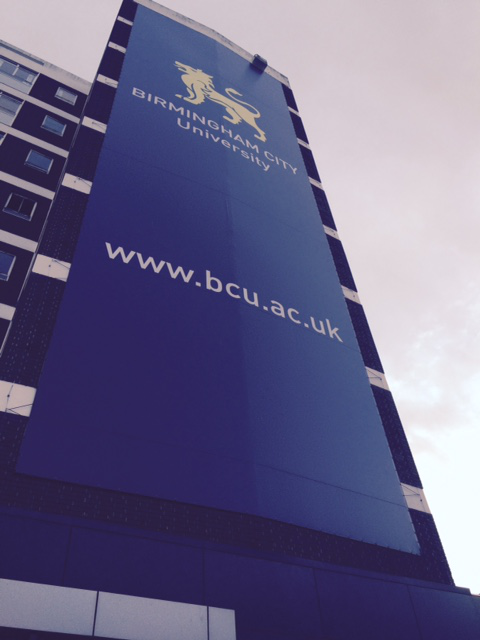 Digital literacy is defined by Jisc as “the capabilities which fit someone for living, learning and working in a digital society”. For those new to this area I recommend you take a look at the Guardian article: 20 ways of thinking about digital literacy in higher education. The article is over three years old now but still offers an excellent introduction, primarily because it explores different perceptions and understandings of the topic. Digital literacy is by its very nature difficult to define, and therein lies the rub!
Digital literacy is defined by Jisc as “the capabilities which fit someone for living, learning and working in a digital society”. For those new to this area I recommend you take a look at the Guardian article: 20 ways of thinking about digital literacy in higher education. The article is over three years old now but still offers an excellent introduction, primarily because it explores different perceptions and understandings of the topic. Digital literacy is by its very nature difficult to define, and therein lies the rub!
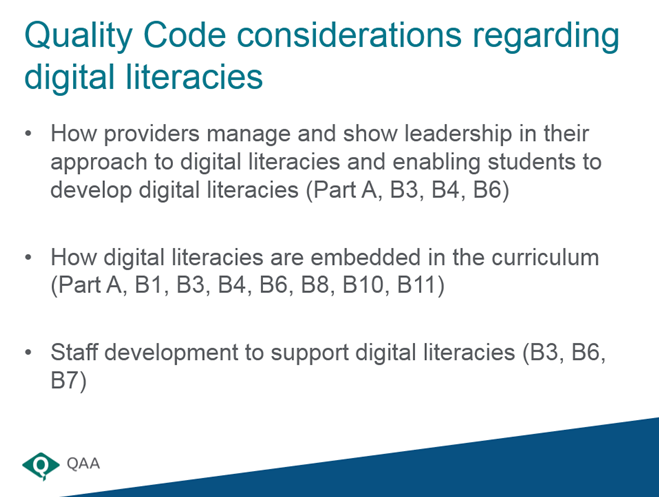
The Embedding digital literacies workshop was opened by QAA staff: Tim Burton, Head of Standards, Quality and Enhancement, Natalja Sokorevica, Development/Project Officer and Gemma Long, Assistant Director in the Quality Assurance Group. They began by highlighting the dual function of the UK Quality Code for Higher Education, which provides co-regulation and a resource to support higher education providers. They explained how the Code is relevant to those who seek to embed digital literacies in HE. The UK Quality Code sets out 19 Expectations that all providers of UK higher education are required to meet and covers areas including recruitment, programme design, learning and teaching, student engagement and assessment. Indicators of sound practice, agreed by the sector, help providers reflect on their approach to assurance and enhancement and ensure their approach is sustainable over time. In light of the digital literacies, the Quality Code can be used to reflect on the following areas:
Strategic leadership - Is there a vision for digital literacy? Who manages it? Do you lead by example, encourage some staff or all staff? How do you maintain momentum? What resources do you commit? Is it a job for specialist staff?
The impact of digital literacy on staff and students - How does digital literacy impact on students? Can the curriculum provide a framework? What are the issues with regard to programme development and digital skills development? What support is there for developing student skills, are there opportunities to think about redesign. What are your recommended technologies? How do you utilise your staff?
How staff are supported to develop inclusive provision? What are staff capabilities? How staff are supported to develop their capacity to embed digital literacies in learning and teaching practice? How sharing of good practice amongst staff who teach and who supports learning in other ways is encouraged?
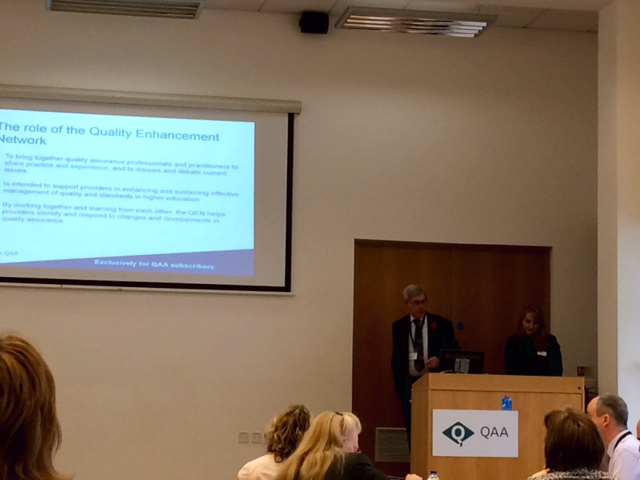
Tim Burton and Natalja Sokorevica from QAA open the day
Jisc and digital literacy
Jisc Educational consultant Helen Beetham provided a potted history of Jisc’s work in the digital literacy area, which dates back to 2009. Their initial Digital literacies programme offered joined-up approaches to digital literacy development to support student achievement and employability. Prior to this projects like SliDA – supporting effective learners in a digital age – looked at institution-wide strategies for supporting learners.
More recently the Building Digital Capability work has been looking at effective use of digital technology by university and college staff in providing a compelling student experience and in realising a good return on investment in digital technology. The programme has a developed some very useable resources. The digital capability framework (shown below) describes the skills needed by staff in a wide range of academic, administrative and professional roles to thrive in a digital environment.
The digital student benchmarking tool, a student-led project, is still under development but has the potential to be an incredibly useful tool. The tool is a starting point for discussions between staff and students about what is working in the digital learning environment and what can be improved. It can be used in student-staff liaison meetings, or students’ unions can use the tool to facilitate a discussion with course representatives to identify good practice and areas for enhancement. Jisc see the digital capabilities challenge as a current priority area for the higher education sector.
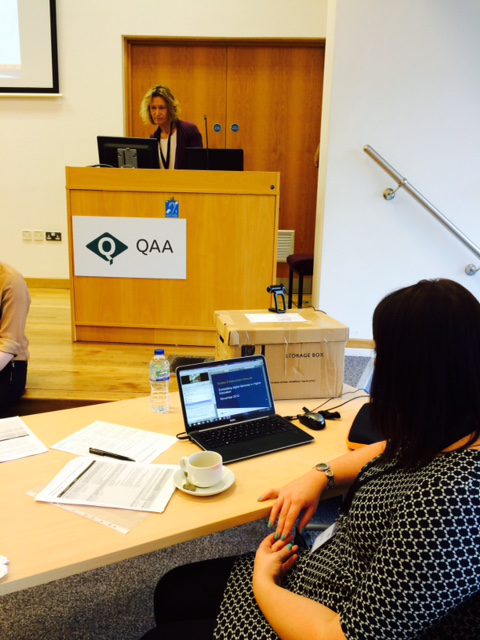
Helen Beetham from Jisc presents while her talk is filmed and streamed to remote participants
The main body of the day was then split up into a two groups of case-study presentations followed by opportunities to discuss the issues in more detail in breakout groups.
Case Studies: University of Northampton and London Metropolitan University
The first case study was presented by Alejandro Armellini, Director of the Institute of Learning and Teaching at higher education, and Rob Howe, head of the Association for Learning and Teaching team, both from the University of Northampton. Their quality enhancement work in this area is built on three approaches: Responsive-reactive; developmental-incremental and radical-innovative. There is excellent practice and ‘not so good’ practice across all three. They shared three examples of current activities: supporting colleagues as they redesign courses for active learning; improving the VLE and online submissions; and C@N-DO – a professional development scheme. Alejandro concluded by saying that that one important aspect of the blended environment is to make sure that students make sense of their digital resources i.e. engage in critical thinking. He explained “Tasks for sense-making are essential, what matters is not the resource, but what students do with it”. Slides for the Northampton case-study are available on Slideshare.
The second case study from Chris O’Reilly, educational technologist at the London Metropolitan University, continued this line of thinking by explaining that students should be creative with digital technologies but also ensure that they are critical of digital media and practices. Chris is situated in the CELT research group. His work with Jim Pettiward looks at digital skills for the 21st century student. Their website – clued up! – is an online app for digital literacies. One of the most interesting aspects of their work is the co-ordination of digital student ambassadors. Chris and his team have also run a network webinars series and digital literacy workshops for the careers service at London Met employability award scheme.
Break-out
The break-out sessions offered an opportunity for reflection on the first case-studies. Delegates were invited to share the steps that their institutions are taking to embed digital literacies to enhance student experience and also reflect on the challenges faced and lessons learnt. The very nature of QEN events, in that they are open to all subscribers, ensures a really interesting mix of higher education providers: from traditional universities and Further Education Colleges, to private providers. The diversity also extended to how far along in the digital literacy embedding the institutions attending were. While some already have all parts of the submission process online, offer most feedback digitally, use digital tools (such as plagiarism tools) as part of assessment and are moving on to writing a digital literacy strategy; to others these are only aspirations and they sit very much at the scoping stage. It is worth pointing out here that there the recent FELTAG (Learning Technology in Further Education) report Paths forward to a digital future for Further Education and Skills recommends that funding bodies “mandate the inclusion in every publicly-funded learning programme from 2015/16 of a 10% wholly-online component, with incentives to increase this to 50% by 2017/2018.” Digital literacy and online learning is very much at the forefront in further Education Colleges
However despite a growing recognition of the importance of digital literacies their embedding within the curriculum still faces many challenges. Those discussed in the group include:
Different digital skill sets requirements between disciplines
Embedding in curricula
Resourcing issues
Apathy from students
Apathy from staff
Managing expectations
More in-depth notes from the discussion sessions are available to all QAA subscribers - contact enquiries@qaa.ac.uk for details. While there are no easy answers to many of these problems is clear that embedding digital literacy in a quality culture is likely to result in more successful outcomes. There was also an agreement that sometimes the best approach is a flexible one that involves others and can be refined over time.
Case Studies: Open University and the University College of Estate Management
Interestingly the final two case-studies were from institutions that predominantly offer their courses as distance learning. Katharine Reedy from the Library services department at the Open University shared the OU’s learning design approach and their recently developed digital and information literacy strategy. The Framework is divided into five competence areas:
Understand and engage in digital practices
Find information
Critically evaluate information, online interactions and online tools
Manage and communicate information
Collaborate and share digital content
The purpose of the framework is to provide a common reference point for module, programme, and qualification teams to use in determining markers of progression in digital literacy that can be integrated with other learning outcomes and student attributes. The framework is available as a PDF under a Creative Commons BY-NC-SA licence for others to use and build on. The Open University have also recently implemented Open Tree, an online social environment for students that awards library use and student skills through gamification. Those interested in finding out more may want to take a look at their badged open course on digital literacy. The Open University are excellent at reflecting on their own pedagogical practice and research projects like the OER Research Hub and the KMI institute provide a wealth of knowledge.
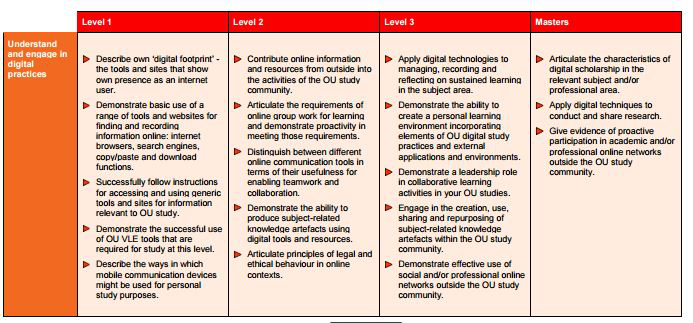
First competence area of the Open University digital and information literacy strategy
The final case-study of the day was from CEM – now UCEM (the College of Estate Management has recently achieved university college title and has become University College of Estate Management (UCEM), a private college with degree awarding powers accredited by the University of Reading and the Open University). The college is regarded as the leading provider of supported online learning for Real Estate and Construction professionals. Over the past year Lynne Downey, Head of Online Learning at CEM, has developed an online learning team and adapted the college’s curriculum into and accessible online resource. Lynne related how the college had students in over 100 countries and used to print out course materials and deliver them by post. The lecturers worked on study materials and had limited connection with students.
The college has since changed its academic offer and no longer sends out course materials. It implemented a programme called ‘engaging our students’: a 5 week compulsory programme for all CEM tutors. The programme, designed to help tutors build online course content and curricula, initially met with some resistance. It has been instrumental in changing staff approach to digital literacy. The programme is now part of the induction module for all new tutors. The CEM team involved in delivery of the programme are now investigating potential to share programme with others in HE and FE. Through the process of delivering the course Lynne has made some interesting discoveries related to staff ability to embrace digital literacy. Staff who are great at delivering online content and engaging with students are not necessarily good at designing courses, and vice versa. The two often require a different skillset.
Conclusions
As the workshop came to a close delegates began to think about practical lessons they could take forward and implement at their own institution. My second breakout group focused on building capability in digital literacy among staff. How do you play to the strengths of the good digital developers and good digital deliverers? How do you bring others on board? We were all left with a lot to think about. During the day the QAA team collated a lengthy list of top tips on how to embed digital literacies at an institution. My personal favourites are:
Engage with learning and teaching coordinators in each faculty, inspiring them to inspire others
Offer a fortnight drop-in sessions with different themes for students and staff to communicate and to share their digital experience
Learnt through FE- just normalise it and embedded in lesson plans- it’s a different culture to HE
Think about digital literacy as a graduate attribute
Recruit students from previous years' groups to form a consultancy group to promote digital literacy among students
Develop staff and then keep them!
There are lot more! If you are a QAA subscriber and would like more details contact enquiries@qaa.ac.uk and the QAA subscriber engagement team will pass on the resources from the events. The workshop ended with an optional surgery facilitated by Helen Beetham from Jisc exploring resources that can support embedding digital literacy in institutions.
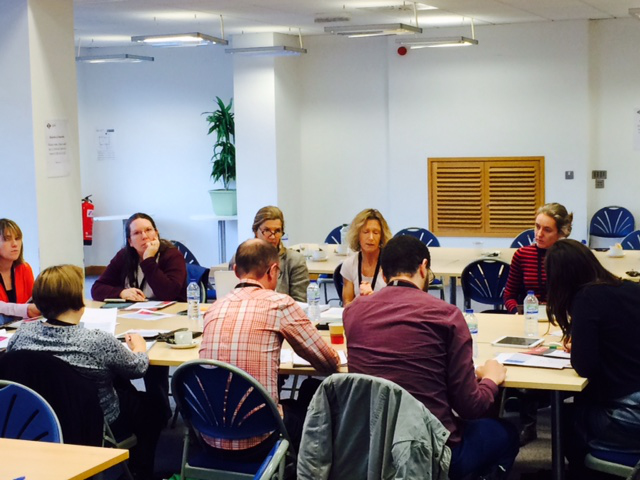
Helen Beetham, Jisc, facilitating an optional surgery exploring resources to support digital literacies.
The hashtag for the day was #QENetwork. Jisc has created a Storify of tweets from the Birmingham event and QAA have released a Storify combining the Birmingham and Southampton days. Future Quality Enhancement Network events are listed on the QAA website.
